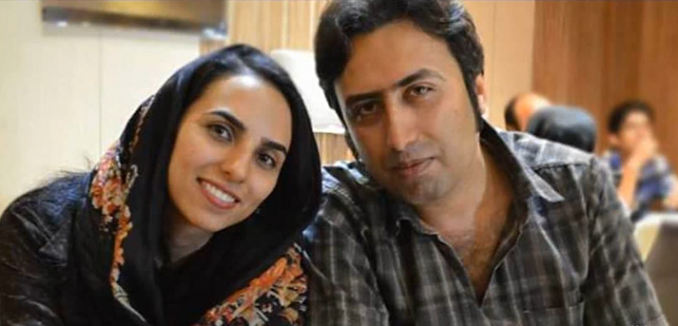The Iranian government has jailed two prominent poets and sentenced them to 99 lashes each “for shaking hands with members of the opposite sex,” the Associated Press reported Tuesday.
The sentences follow a pattern of arrests and convictions targeting activists, journalists and artists that has served as a grim backdrop to President Hassan Rouhani’s efforts to soften the country’s image and improve relations with the West, including through the landmark nuclear agreement reached last summer. …
“I think people thought with the nuclear deal, there would be sort of a bit of a thaw as well or a bit of an opening up,” said Karin Deutsch Karlekar, the director of Free Expression Programs at PEN America, an organization promoting literature and freedom of speech. “I think the judiciary is sort of pushing back and trying to make clear that there isn’t going to be that opening people were hoping for.”
Fatemeh Ekhtesari, a practicing obstetrician, and Mehdi Mousavi, a trained doctor who teaches literature and poetry, were first arrested in December 2013, months after Rouhani took office. Earlier this month, Ekhtesari received an 11½-year prison sentence, while Mousavi got nine years on charges ranging from propaganda against the state to “insulting sanctities,” as well as the lashings, according to PEN.
Both Ekhtesari and Mousavi have previously published poetry that was approved by government censors.
The crackdown against the poets is the latest in a pattern of worsening repression in Iran. The AP noted that at least 30 journalists were imprisoned in Iran at the end of 2014. One of them is Washington Post reporter Jason Rezaian, who was convicted of espionage in a widely criticized secret trial.
Despite President Hassan Rouhani’s reputation as a moderate, the human rights situation in Iran has deteriorated under his administration. According to the United Nations, over 750 people were executed in Iran during Rouhani’s first full year in office, the highest total in over a decade. Last week, UN Secretary-General Ban Ki-Moon expressed concern over the rapid rate of executions in Iran. In July, Amnesty International projected that the Islamic Republic would carry out over 1,000 executions this year.
In Should the U.S. Take Iran’s Human Rights Problem More Seriously?, which was published in the April 2015 issue of The Tower Magazine, senior editor Ben Cohen interviewed Ahmed Shaheed, the UN’s special rapporteur on the human rights situation in Iran. Shaheed mentioned that institutionalized discrimination against Iranian women was worsening under Rouhani:
Iran’s systematic discrimination against women is another pillar of its theocratic regime. “Sitting here at the UN for the last eleven years, I hardly hear anyone talk in any meaningful way about the rights of women in Iran,” [Hillel] Neuer [executive director of UN Watch] told me.
Shaheed’s reporting is ideally placed to break that particular silence, at least in the corridors of the UN. “Recent legislative attempts made by the Iranian Parliament appear to further restrict the rights of women to their full and equal enjoyment of internationally recognized rights,” he wrote.
The discrimination, said Shaheed, is especially pronounced in the spheres of education and employment. “A few years ago, nearly 70 percent of the university population was made up of women, but there’s been a policy established in the past two or three years designed to push women back from the public sphere,” he told me. “The first element of this was the imposition of quotas on women’s access to university, thereby in a matter of two years reducing the number of women enrolled at university to less than 50 percent of the total university population.”
[Photo: nedatelevision / YouTube ]




